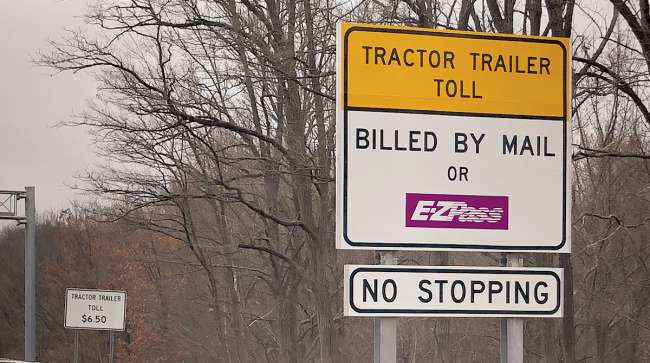Senior Reporter
Appeals Court OKs Contentious R.I. Truck Tolling Plan

[Stay on top of transportation news: Get TTNews in your inbox.]
A federal appeals court has ruled that Rhode Island may reinstate its controversial truck-only tolling program, but deemed unconstitutional a set of caps that set limits on collection amounts.
The program, called RhodeWorks, has been mired in court battles since American Trucking Associations and two motor carriers in 2018 challenged the law’s constitutionality. While those groups won a victory in 2022 when a district court temporarily halted the program — which collects tolls exclusively from tractor-trailers — the state on Dec. 6 scored a partial appeals court victory when a three-judge panel ruled that the program could be reinstated as long as the payment caps were removed. The court ruled that the caps ran afoul of the Commerce Clause, a provision in the U.S. Constitution that prohibits states from adopting laws that, per the appeals court, “discriminate against or unduly harm interstate commerce.”
While the appeals court agreed with the lower court that the caps themselves violated the Commerce Clause and were thus unconstitutional, it ruled that the caps could be removed from the RhodeWorks program, effectively clearing the way for the trucks-only tolling program — which it did not find unconstitutional — to be reinstated.
“We agree that the caps render the tolls unlawful, but hold that the statute’s application to only tractor-trailers does not. We also hold that the unlawful caps are severable from the rest of the statute,” the appeals court said.
The RhodeWorks tolls were subject to three statutory caps. A truck could not pay a toll more than once in each direction, could not pay more than $40 per day, and could not pay more than $20 for making a single “through trip” from Connecticut to Massachusetts. The tolls are collected on 13 bridges in the state.
Lori Heino-Royer of Waabi discusses the latest developments, breakthroughs and key industry partnerships in autonomous trucking. Tune in above or by going to RoadSigns.ttnews.com.
In a statement, ATA Chief Legal Officer and General Counsel Richard Pianka said, “We’re pleased that the Court of Appeals agreed with us and the trial court that the RhodeWorks tolls unconstitutionally discriminated against interstate commerce, and are reviewing the decision and considering next steps.”
The Rhode Island Trucking Association warned that the ruling could raise the ire of businesses and consumers in the state.
“The First Circuit confirmed that the RhodeWorks caps spared the Rhode Island trucking industry, and the Rhode Island residents they serve, from the full burden of the tolls,” the group said in a statement. “If Gov. McKee and the General Assembly are considering reactivating the tolls without those protective caps, they first need to consider whether they are willing to break the promise that was made to the local business community as a condition of passage of the legislation, and be candid with Rhode Island residents that these increased costs will be reflected in the price of goods, nearly all of which reach them by truck.”
State leaders, however, celebrated the ruling.
“The court’s ruling allows the state to continue using a proven tool to make vital upgrades and repairs to Rhode Island’s infrastructure, a matter of great importance to residents and businesses across our state,” Gov. Dan McKee said in a statement. “The ruling also prevents what could have been a major clawback of tens of millions of dollars in previously collected toll funds, which would have been a significant blow to Rhode Island taxpayers.”
Want more news? Listen to today's daily briefing above or go here for more info
The original lawsuit alleged that the tolling plan required out-of-state heavy trucks to pay nearly all of the tolls, while mostly exempting state businesses, cars and intrastate motor carriers. In its ruling, the appeals court noted that just 19% of trucks paying tolls are registered in Rhode Island.
Rhode Island Attorney General Peter Neronha in a statement said, “In 2016, the General Assembly and Governor [Gina] Raimondo made the decision that tolling trucks is in the best interest of all Rhode Islanders and a necessary revenue source to support repairs and upkeep of the state’s transportation system. We have now successfully defended the legality and constitutionality of that decision. Today, the First Circuit has held that, with the exception of caps on tolls, RhodeWorks is constitutional.”
In 2016, Rhode Island passed the Rhode Island Bridge Replacement, Reconstruction, and Maintenance Fund Act, commonly called “RhodeWorks”. Under RhodeWorks, tractor-trailers and large trucks pay a toll when they cross any one of the specified bridges within the state. Rhode Island committed to use the toll revenue to replace, reconstruct, operate and maintain its bridges on the National Highway System.


